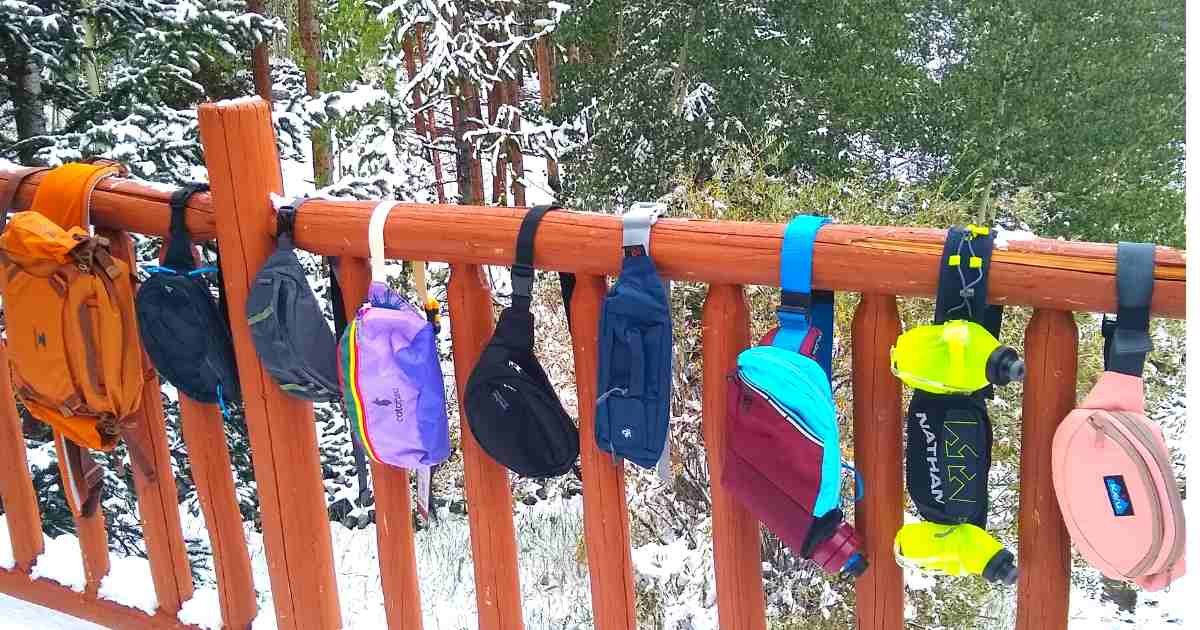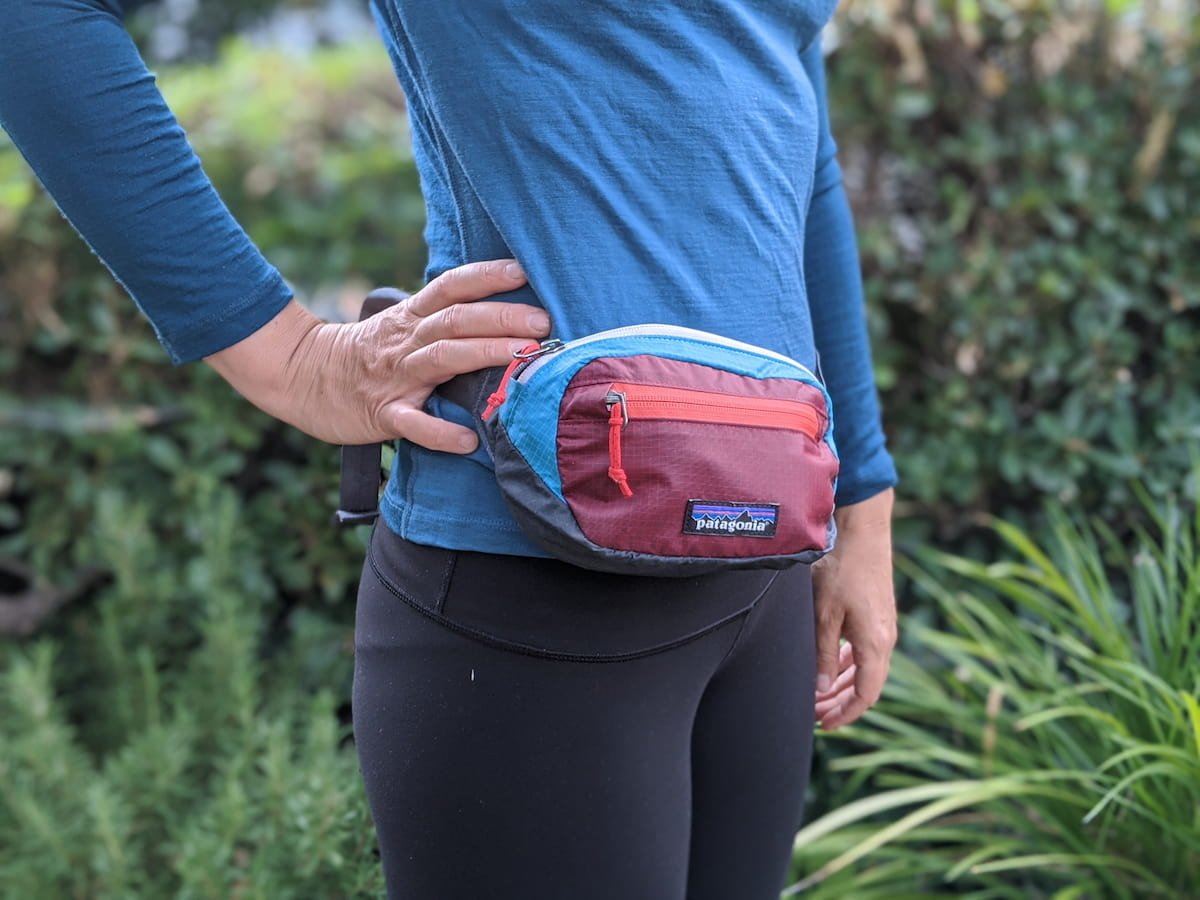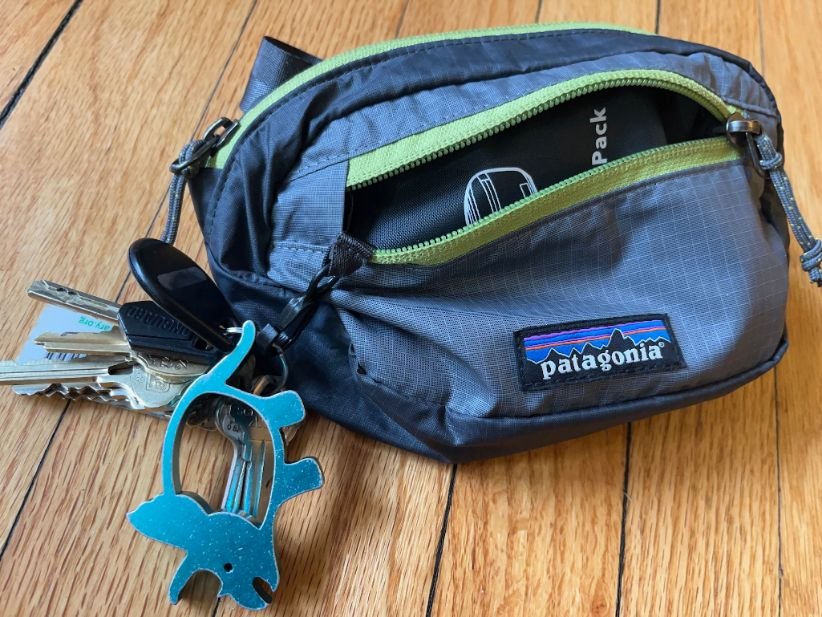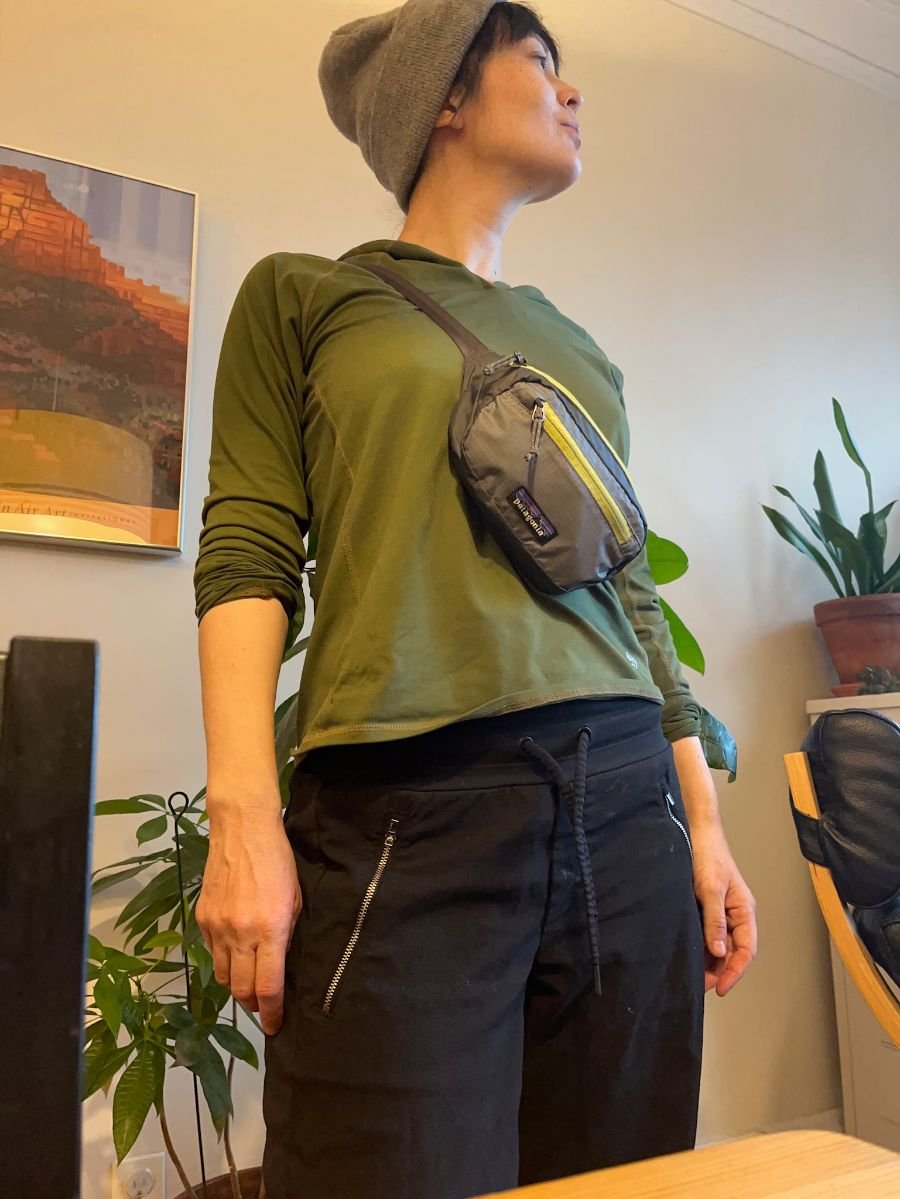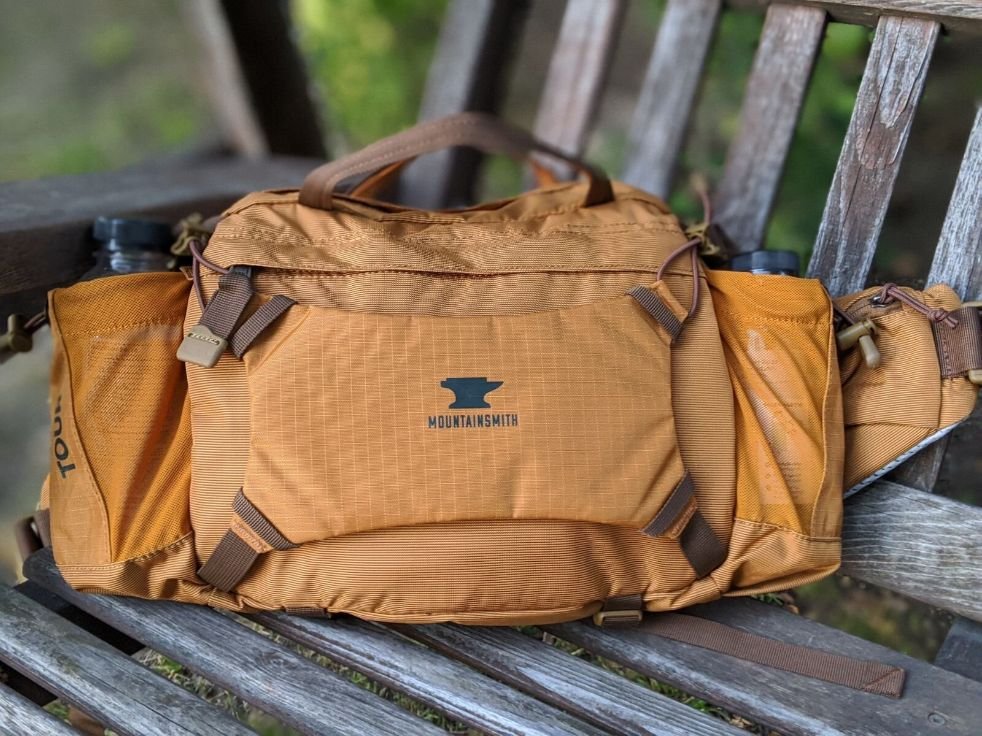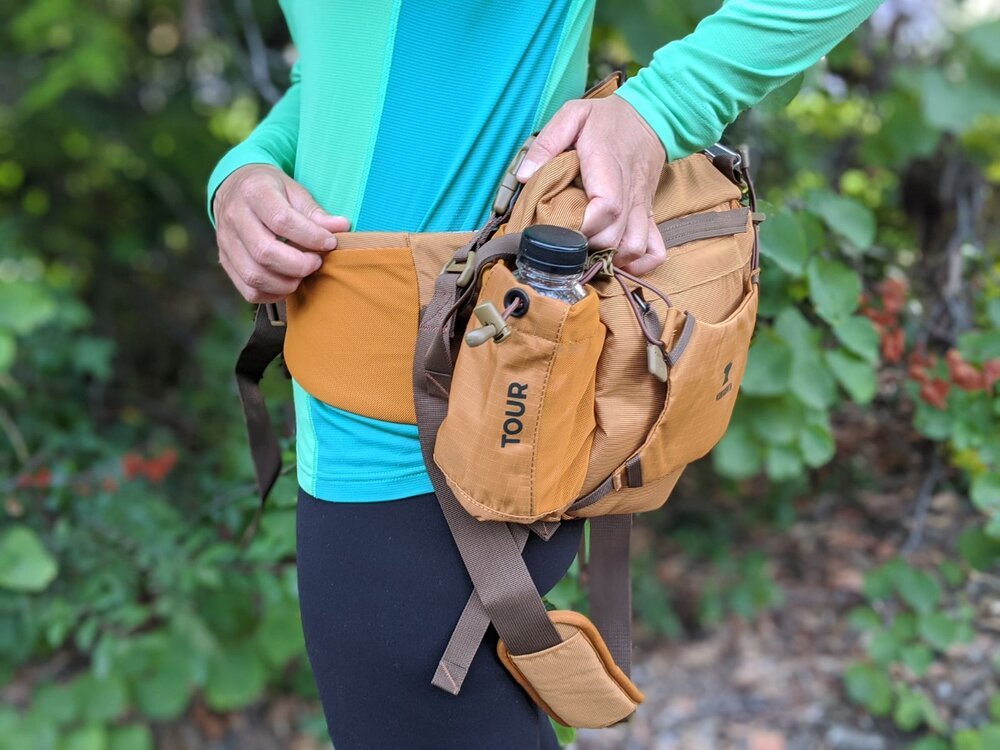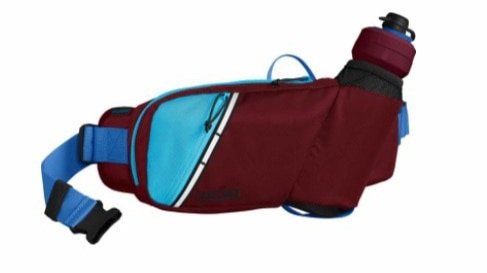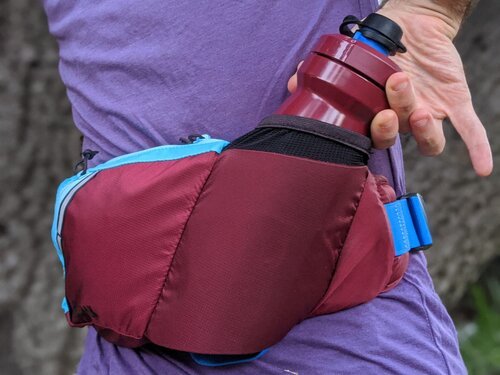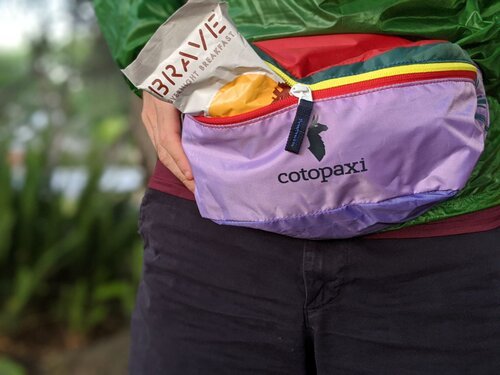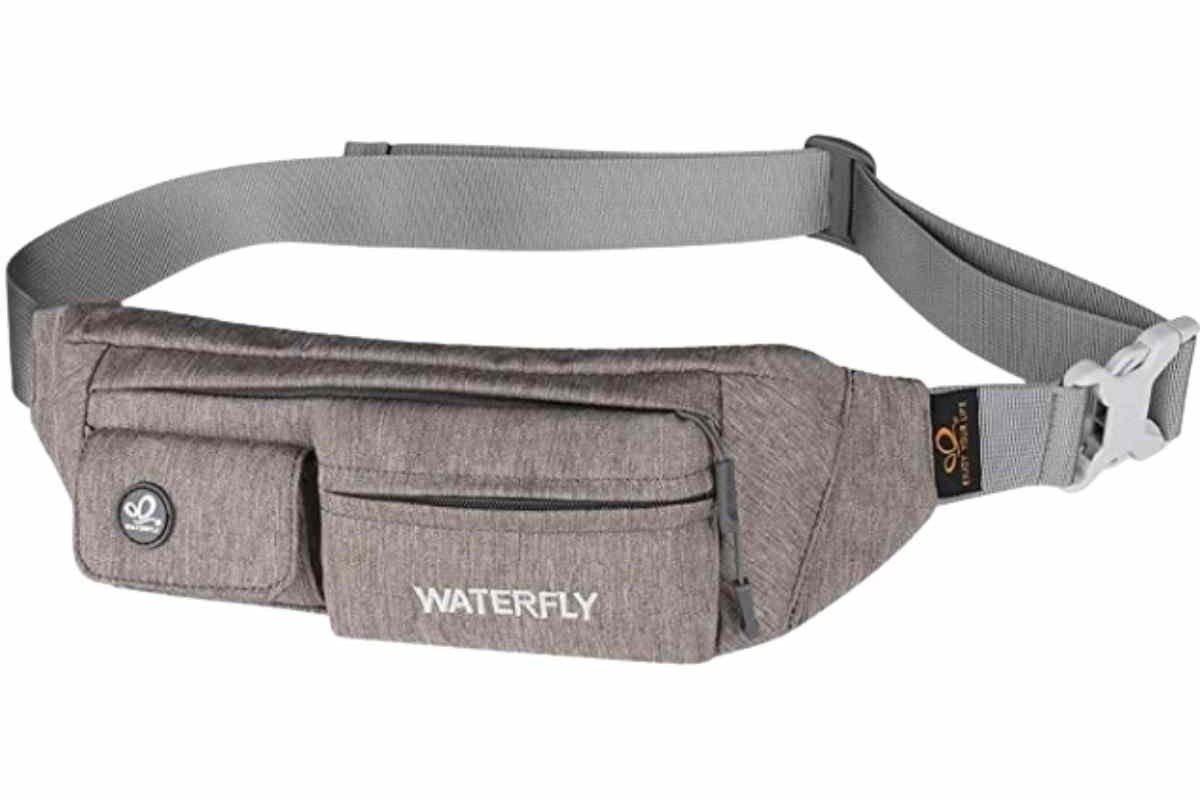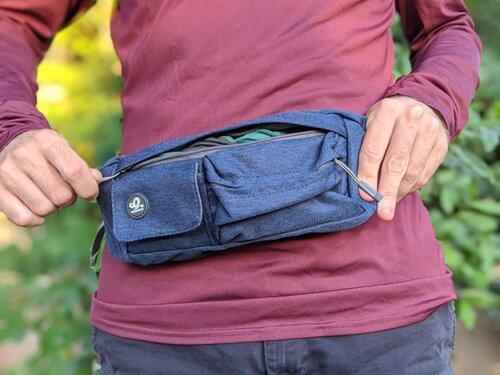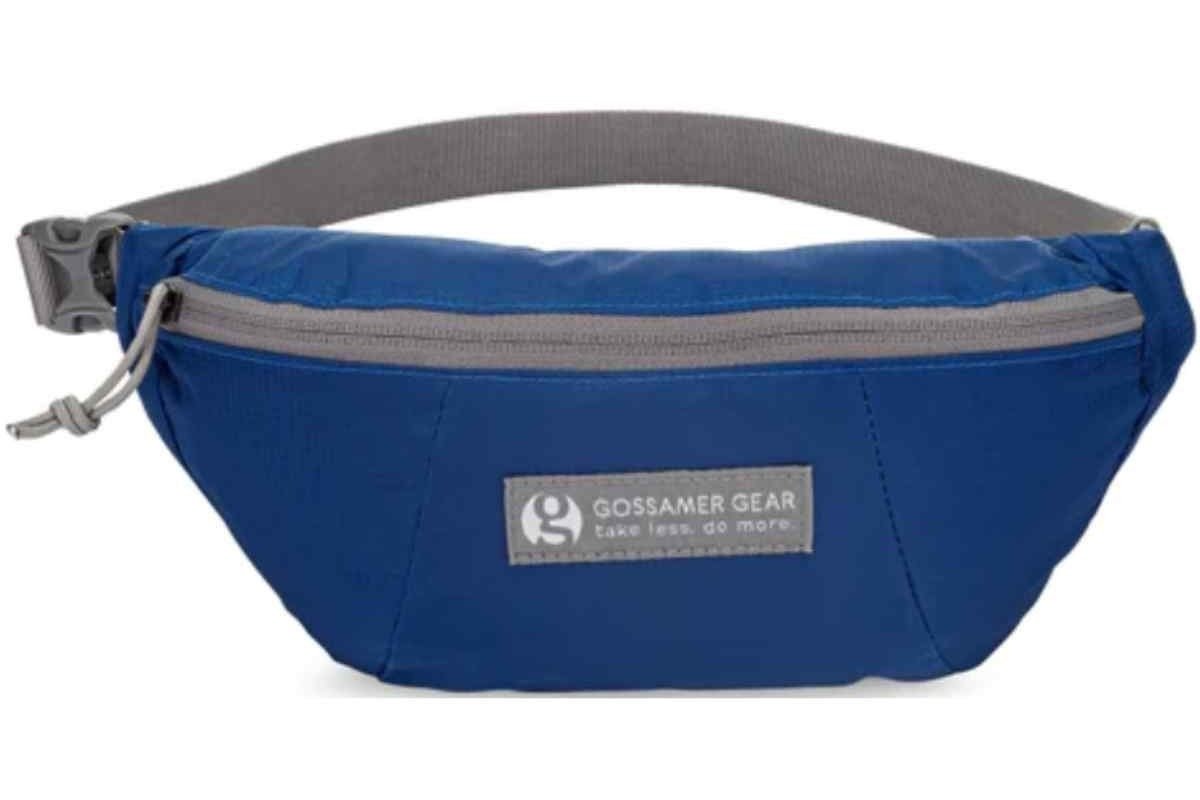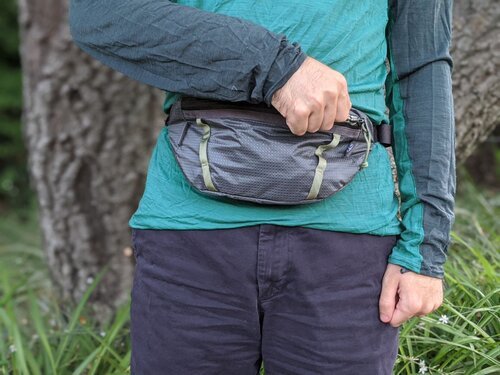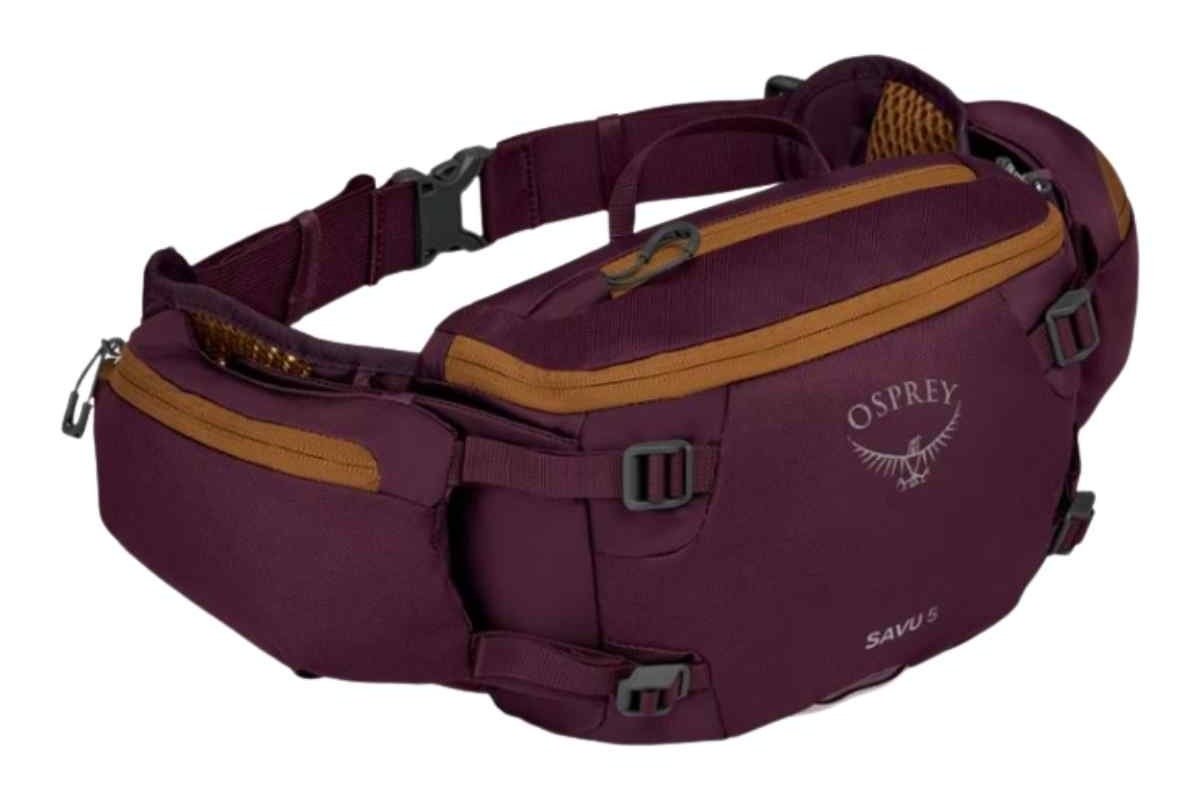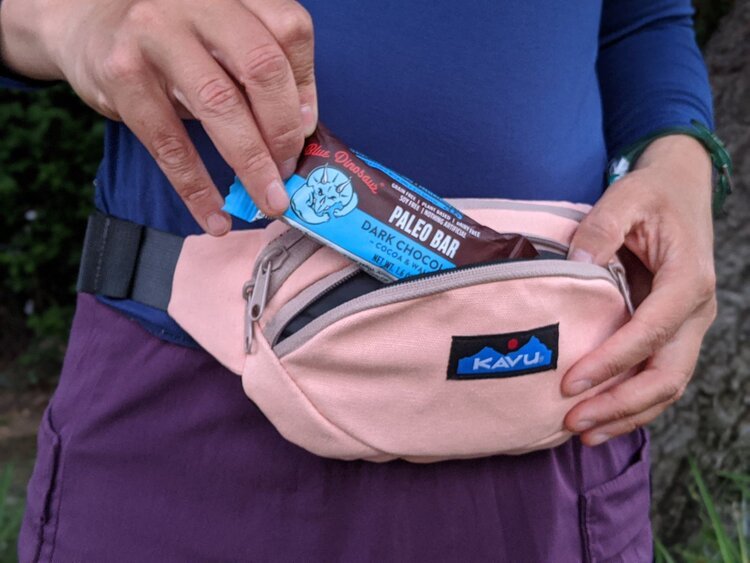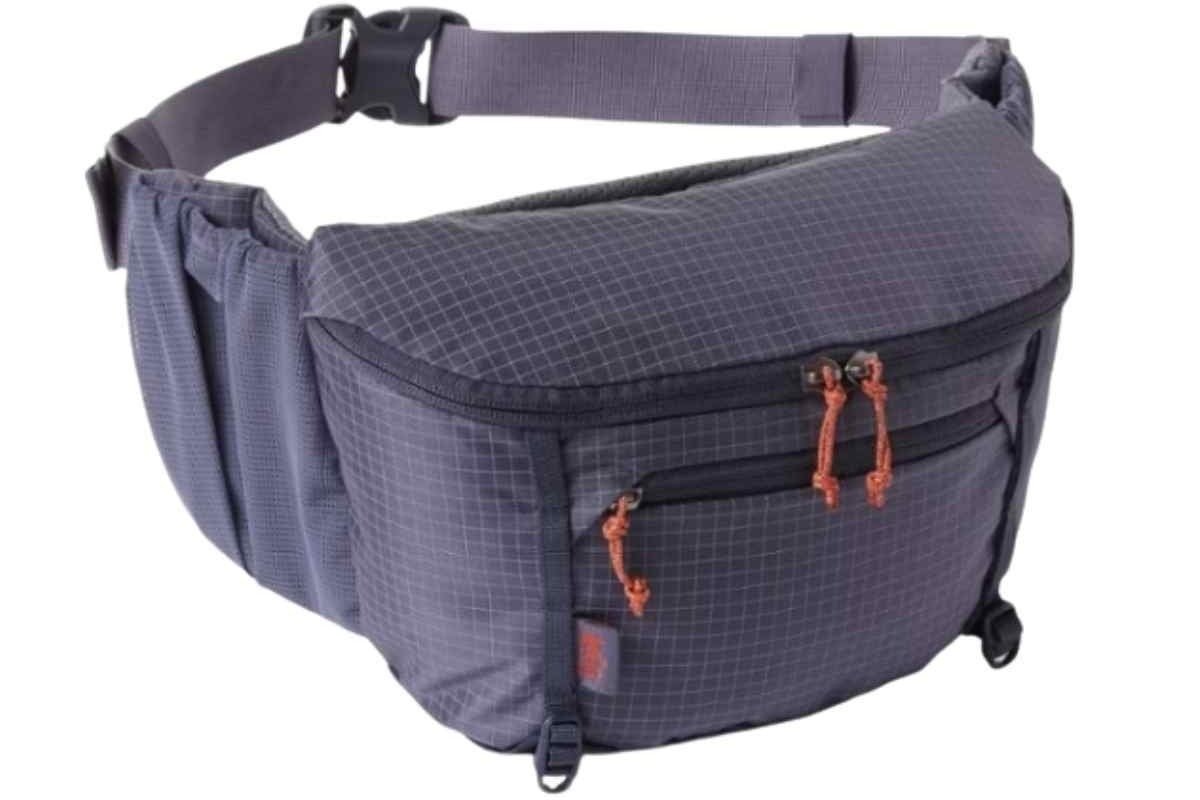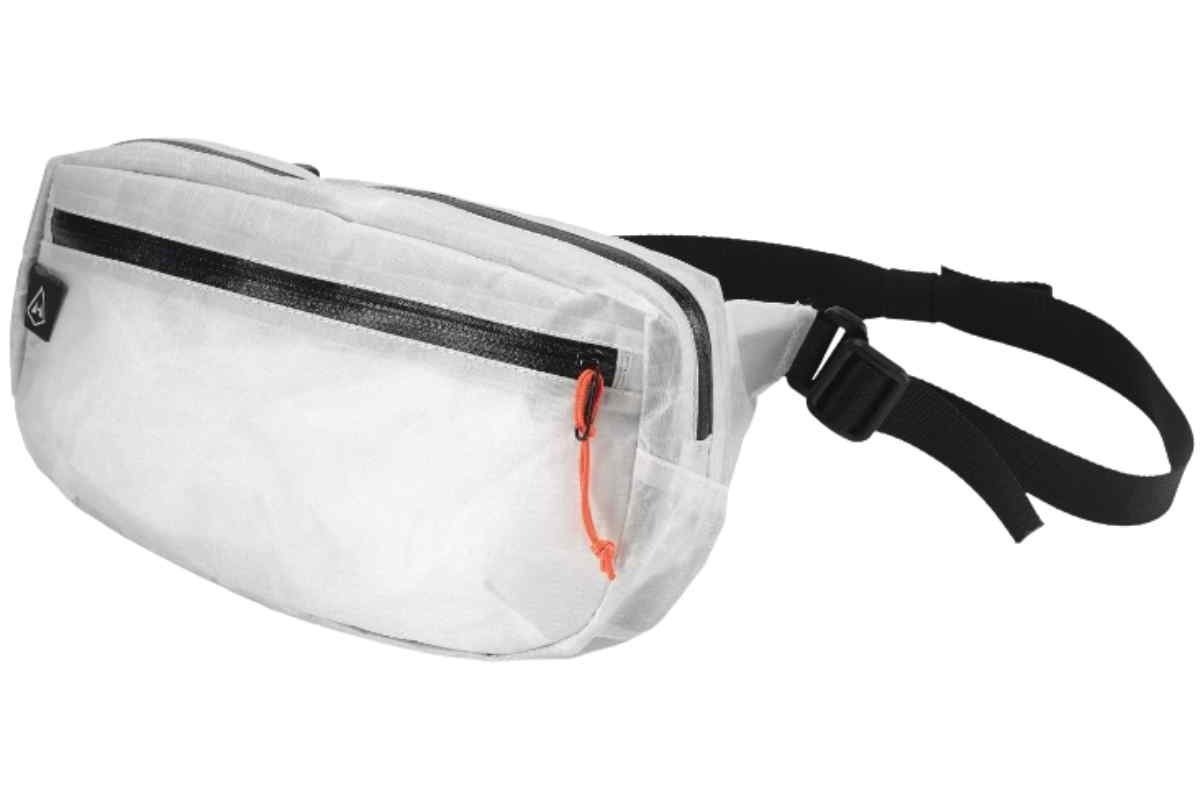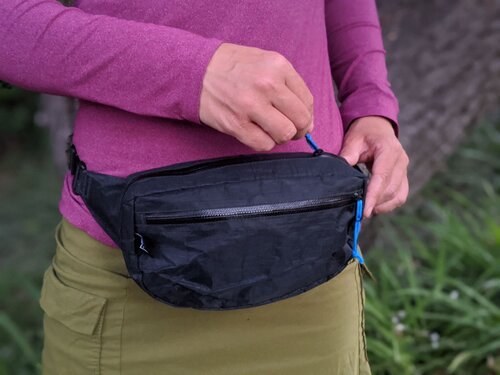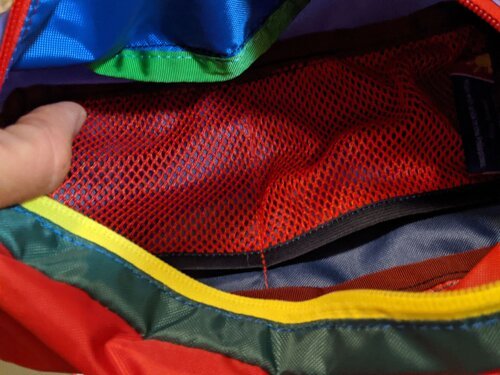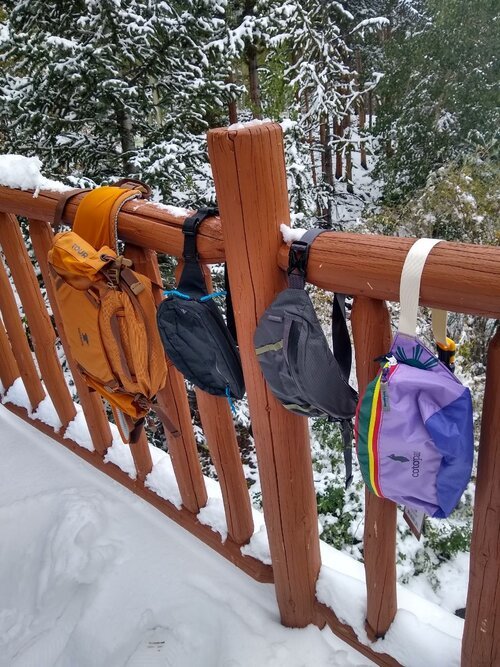Best Hiking Fanny Packs, Waist Packs, and Lumbar Packs of 2024
The Top Fanny Packs For Hiking, Biking, and Running Around Town
April 30th, 2024
Home > Gear Reviews > Hiking
Love ‘em or loathe ‘em, fanny packs prove useful for carrying your essentials, allowing you to ditch your backpack and keep your hands free. We researched 62 of the most-talked-about fanny packs, waist packs, lumbar packs, and hip packs in outdoor media and popular news stories to find the best fanny packs, waist packs, and lumbar packs for hiking,
We ranked fanny packs on criteria like price, waterproofness, storage, and ease of use. Then we tested the 19 most promising packs for hiking, biking, city life, and more.
After an estimated 500 miles of hiking, long bike rides, and visits to the farmer’s market, here are the best fanny packs for leisurely strolls, intense hikes, or a ride through town.
We create reader-supported, objective gear reviews independently selected by our editors. This story may contain affiliate links, which help fund our website. When you click on the links to purchase gear, we may get a commission, without costing you an extra cent. Thank you for supporting our work and mission of outdoor coverage for every body! Learn more.
For more of our favorite gear recommendations, see our most popular Gear Guide stories:
Comparison Table
| FANNY PACK | TREELINE AWARD | PRICE* | WAIST SIZE | CAPACITY | WEIGHT | # OF POCKETS | WATER RESISTANT? | WATER BOTTLE POCKETS? | DIMENSIONS (IN) |
|---|---|---|---|---|---|---|---|---|---|
| Patagonia Ultralight Black Hole Mini Hip Pack | Best Overall Read why |
$35 | Not listed | 1 L | 3.5 oz | 1 | No | No | 8 x 4.75 x 2 |
| Mountainsmith Dry Tour Lumbar | Best High Volume Lumbar Pack Read why |
$90 | 28 - 48" | 9 L | 25 oz | 6 | No | Side pockets | 11.5 x 10 x 5 |
| Camelbak Podium Flow | Best Running Waistpack Read why |
$55 | 28 - 46" | 2 L | 6 oz | 2 | No | Back pocket | 5.1 x 17.3 x 4.3 |
| Cotopaxi Bataan | Best In-Town and Everyday Read why |
$33 | Not listed | 3 L | 4 oz | 2 | No | No | 11 x 5.5 x 3 |
| Waterfly Fanny Pack | Best Budget Read why |
$20 | Up to 50" | Not listed | 5 oz | 3 | No | No | 13.5 x 1.75 x 3.5 |
| Gossamer Gear Bumster | Best For Climbing and Festivals Read why |
$29 | Up to 45" | 1.5 L | 3.1 oz | 3 | No | No | 5.5 x 10.5 x 2.5 |
| Thrupack Summit Bum Classic | Best for Thru-hiking Read why |
$60 | Up to 50" | 2.5 L | 3.5 oz | 3 | Yes | No | 9 x 5 x 3 |
| Osprey Savu 5 | Best Waist Pack for Carrying Bottles Read why |
$65 | 25 - 50" | 5 L | 13.4 oz | 5 | No | Side pockets | 7 x 9 x 4 |
The Best Hiking Fanny Packs
Best Overall Fanny Pack: Patagonia Ultralight Black Hole
Price: $35
Volume: 1 L
Weight: 3.5 oz
Dimensions: 8x4.75x 2 in
What we liked: versatile, bluesign certified, recycled material
What we didn't like: not bottle compatible, waist strap could be longer
If you’re looking for a hands-free way to carry the bare necessities (excluding hydration), the Patagonia Ultralight Black Hole Hip Pack is the best fanny pack for you--and the best fanny pack for most hikers.
What makes it great for hiking is that it's lightweight and stores in its own pocket when not in use, yet is durable and has great pockets to organize hiking essentials. Whether walking the dog or carrying basic hiking gear for easy access, this Black Hole sits comfortable on your waist and looks great in many fun colors.
In the 1L volume, we were able to fit a phone, sunscreen and lip balm, sunglasses, a headlamp, a snack, electrolytes, gloves, a wallet, and keys (it has a handy key ring so you won't accidentally lose your keys when pulling something out mid-hike).
It's become or go-to bag for dog walking and can fit doggie bags, a ball, treats along with human gear like a phone, wallet, and keys. It's got a touch of style and you have your choice of 8 color combinations, including solid blue or black.
This isn't the hiking waist pack we'd recommend if you want to carry layers or water bottles–check out our backpacking or lumbar pack winners for that. But if you like to always have a basic outdoor bag packed and ready for an impromptu hike or dog walk, we think this is the best option.
Compare Prices Of The Patagonia Ultralight Black Hole
The Patagonia Black Hole Mini holds a phone, wallet, keys, snacks, sunscreen, sunglasses, lip balm so you can be go on adventure in a moment’s notice.
Fabric
This pack was made with sustainability in mind—it's made of 100% recycled ripstop nylon and polyester. The fabric is also bluesign certified, indicating the supply chain is safe for the environment, workers, and customers. The newest version is sewn in a Fair Trade Certified factory.
Previous versions of this fanny pack had a Durable Water Repellent (DWR) finish and you can still find older models for sale with that technology. The newest version of Patagonia Ultralight Black Hole Mini fanny pack is part of Patagonia's commitment to make gear without PFCs/PFAS, forever chemicals. You can read more about PFAS in our article on PFAS in outdoor gear.
The Patagonia Black Hole has a key holder clip and pockets to keep essentials organized.
The Black Hole Mini is the perfect bag for dog walks. A standard dog poop bag dispenser clips onto the outside for convenience.
Comfort and adjustability
The waist belt is nice and flexible, meant for wearing both around your waist or across your chest. This makes it versatile for shorter hikes and also in urban settings.
Volume
The Patagonia Black Hole can be worn as a shoulder sling bag for urban situations.
The Ultralight Black Hole Hip Pack Mini has a volume of 1L, which is on the lower end for a hiking fanny pack.
We found that small size to be an advantage in many situations.
For example, it stows away into its own pocket when not in use, such as when it's really raining or if you're traveling and a day hike is just one of many activities that you're packing for.
Yet it's the perfect sizing for shorter hikes where you just want to get up and go.
We were hard pressed to dislike anything about this waist pack, but did find some hikers wanted water bottle pockets. This pack does not come with its own water bottles, so if you have a tall bottle you want to carry in a waist pack, this could be an issue. See our recommendation for winner for best hydration pack for carrying bottles or look at our guide for Best Mountain Bike Hip Packs. They tend to be very similar to hiking fanny packs but always have hydration compatibility.
Sizing
Lastly, we wanted the waistband to be longer to be more inclusive of hikers of all sizes. Additionally, some testers who wanted to use it as a sling pack found that it wasn't long enough to fit over shoulders (admittedly, it wasn't designed exactly for that use).
Warranty and repairs
Like all Patagonia gear, this waist pack comes with Patagonia’s Ironclad Guarantee. This feature covers Patagonia gear for life.
Patagonia’s environmental mission strives to repair gear instead of manufacture new items. For a minimal price, they’ll even repair items with normal wear and tear.
Who else likes it
The Ultralight Black Hole is recommended by Gear Junkie, Clever Hiker, Wirecutter, Bearfoot Theory, Field Mag and the Tortuga blog. It has hundreds of positive customer reviews on REI and Patagonia's website. This is a fan-favorite and one of the top-rated pieces of gear we've seen with near-universal acclaim.
Best High Volume Lumbar Pack: Mountainsmith Tour
Price: $90
Waist size: 28 to 40 inches
Volume: 9 L
Weight: 1 lb 9 oz
Dimensions: 11.5" x 10 "x 5”
Pockets: 6
What we liked: multi-use, versatile, functional pockets
What we didn't like: extra space can lead to a heavy pack
I found the Mountainsmith Tour Lumbar Pack to be a fantastic alternative to a regular backpack—and especially great as a multi-use product. For those hikers who prefer a hands-free hiking experience, hate to have a heavy pack creating a sweaty back, or prefer a lumbar pack that sits behind instead of in front, the Mountainsmith Tour is the best lumbar pack and best high volume waist pack out there.
Compare Prices Of The Mountainsmith Tour
The Mountainsmith Tour is large and fashionable enough to work as a city bag and a hiking bag. Photo by Liz Thomas
Versatility
What’s attractive about the Mountainsmith Tour Lumbar pack is its versatility: you can use it for biking, longer hikes, or in lieu of a briefcase in casual business environments, or even as a diaper bag (it’s the same size as many bags marketed as “diaper bags” and Mountainsmith’s website touts that the Tour makes a good diaper bag).
Many customer reviewers said they appreciated the many needs this pack could meet. One of our writers is a hiker with an injured shoulder who uses this pack for overnight backpacking trips.
Volume
I was prepared to dislike this pack because of its larger capacity. When I typically think of fanny packs, I think of a compact bag ideal for carrying smaller items.
Instead, I discovered that I really liked having the larger capacity of the Tour. It is 11.5" x 10" x 5" which means the roomy main compartment is large enough to fit an e-reader or a mini laptop, which made it a convenient everyday bag for me, too.
However, since one of the most attractive aspects of this pack is all of the pocket space, one issue that could come up with the Tour is the urge to fill it.
If you are the type of person who has to fight the urge to fill every pocket and pouch up with stuff, consider how extra items will change the weight of the pack during a longer excursion.
The urge to fill The Tour is a minor issue that you just have to be aware of as you mindfully pack for your next adventure. You can fit a full size hiking water bottle in each water bottle pocket.
Sizing Available
The size is great if you’re needing to carry items besides your wallet. The adjustable waist strap is easy to adjust, fitting waists from 28-48 inches.
The Mountainsmith Tour has adjustable water bottle holders, so you can use your own bottles (unlike the waistpacks we considered with water bottles). The strapette that turns it into a messenger bag or backpcak is shown below. Photo by Liz Thomas
Front Zippered Pocket
The small zippered pocket on the front of the pack is especially nice because it gives you easy access to important items—like your ID, keys, or cards—without needing to access the main compartment in the pack. It’s also big enough for snacks like energy bars.
Front Waist Belt Pocket
This pocket is located directly on the right-hand side of the waist belt. This pocket is ideal for storing keys and is also ideal for storing a cell phone or snack bar. Behind the pocket, there is also an additional pocket that you could also stick your wallet into or some other slightly larger item.
Side Reinforced Water Bottle Holders
There are two water bottle pockets that are on each side of the pack, with adjustable bungee cords to help secure the bottles. I really liked that there were two pockets because you can carry two water bottles and even a hydration reservoir if needed for longer treks in the wilderness.
Strapette
The strapettes (Mountainsmith’s term for an adjustable strap that turns the lumbar pack into a backpack) are sold separately. At $28, I think it’s worth the money to purchase one. Best yet: that price hasn't gone up in a couple years, unlike so many other pieces of gear.
While the Tour works well as a hiking fanny pack, the strapette shoulder strap creates more usage options for the pack, turning it into a backpack with a racerback. The Tour is the only hip pack we considered that has this capability.
Front Compression Attachment System
Another unique aspect of this fanny pack is the compression straps, located on the front of the pack. Having a compression strap is ideal for storing lighter jackets or other pieces of gear for easy secure and easy access.
Bottom line: This larger volume lumbar pack is ideal for replacing your day hiking backpack or using around town. It's a lumbar pack that can carry everything you need with all the thoughtful designs of a traditional backpack.
Who else likes it
The Tour is recommended by Gear Junkie, Wired, and UpgradedPoints with accolades for its use in both the backcountry and as a travel fanny pack. The Tour is also a best seller at REI.
Best Running Fanny Pack: Camelbak Podium Flow Belt
Price: $50
Waist size: 28-46 inches
Volume: 2 L
Weight: 6 oz
Pockets: 2
What we liked: snug pocket, efficient design, freestanding water bottle
What we didn't like: small pack, shorter waist strap
The Camelbak Podium Flow Belt is a hiking fanny pack with an unobtrusive built-in bottle pocket, giving you all the carrying capacity and water needed for short to moderate day hikes, mountain bike rides, peak bags from basecamp, and strolls around town. It also works extremely well as a running fanny pack.
The bottle on the Podium Flow pocket is snug and situated at an angle for easy access when wearing the Podium Flow on your back as a lumbar pack.
The snugness of the pocket was something I really liked about the Camelbak Podium Flow Belt—and so do customers on Camelbak’s website, who gave the Podium Flow 4.6 out of 5 stars. A secure fit is crucial for trail running, which is why we made it our running fanny pack pick.
Compare Prices Of The Camelbak Podium Flow Belt
The Camelbak Podium Flow has a built-in bottle pocket that allows easy access while also preventing the bottle from slipping. Photo by Liz Thomas
Style
Personally, I love the look of this stylish fanny pack. And when it comes to function, I feel like the designers of the Camelbak Podium Flow made the generic fanny pack design much more efficient.
The Podium Flow is a popular hip pack in the MTB community (it’s actually marketed towards mountain bikers) and recommended by SingleTracks and Pink Bike.
We found the Podium Flow handy for hiking, trail runs, and around town. Customers echo our experience. It has 5/5 stars and 38 reviews at Google Reviews and Backcountry’s second highest-rated fanny pack from customers.
Water Bottle + Pocket
This affordable pack (it’s priced in the middle of the range of packs we considered) comes with a water bottle that carries a little over 20 oz of liquid. It’s a little difficult to put the bottle back once removed, but this got easier over time as the fabric stretches slightly with use.
Plus, we found all the water bottle hip packs to have this issue, and the Flow was still the easiest. We’d much prefer a bottle holder that is too tight than one that loses the water bottle while running or biking.
Unlike the water bottle on the Nathan TrailMix belt (our review below), the bottle on the Podium belt is a normal-shaped bottle. It can stand up on its own and fit in your car's cupholder for the ride home. While being a normal-shaped bottle seems like a given, we didn’t find this feature on any of the other hip packs that come with water bottles.
The Camelbak Podium bottle has a flat bottom so can stand up on its own. Here, we can use a gravity feed water filter to put clean water into our Podium bottle. This process was much more difficult for other bottles that came with waistpacks. Photo by Liz Thomas
Padded Mesh Backing
The padded mesh backing is perfect for soaking up the sweat as you make your way up the mountain or around town.
Adjustable Waist Strap
The adjustable waist strap on the Podium Flow is a little shorter than the waist belts on some of the other packs in this review—the fit ranges from 28-46 inches, a little shy of the seemingly standard 48 inches.
Zippered Pocket
The Podium Flow is small—much smaller than the more-versatile Mountainsmith Tour (see our full review above). For a quick ride or hike, however, its main pocket can hold small snacks, keys, sunscreen, lip balm, a windshirt, snacks, and most cell phones.
If you like the idea of the Camelbak Podium Flow Belt, but need either more or fewer inches on the waist belt, consider the Waterfly Slim Soft (see our full review below). While there’s no hydration option on this model, the waist belt runs from 24-50 inches.
What others are saying
We found the Podium Flow handy for hiking, trail runs, and around town. Customers echo our experience. It has 5/5 stars and 38 reviews at Google Reviews and Backcountry’s second highest-rated fanny pack from customers.
Best Every Day Fanny Pack: Cotopaxi Bataan Del Día
Price: $32.50
Volume: 3 L
Pockets: 3
Weight: 4 oz
Dimensions: 11” x 5.5” x 3”
What we liked: style, made from lightweight remnant fabric, can be used a cross body bag
What we didn't like: less durable
Fun, whimsical, and stylish in that 80’s throwback kind of way, the Cotopaxi Bataan Del Día Fanny Pack is great for around town or that next beach party.
This 3L pack is big enough for a few sundries but small enough so you can’t lose anything inside. Two small mesh pockets also keep your smaller items—keys, cash, and credit cards—from moving around your pack as you move.
For use in town, it has a long waist strap that can convert into a crossbody bag. It's made of upcycled fabric by sewers who get to decide their own color combinations and Cotopaxi is a Certified B-Corp. The Bataan is a bestseller at REI and favorite of many hikers due to its everyday look and fun design.
Compare Prices Of The Cotopaxi Bataan Del Dia
The Cotopaxi Bataan Del Dia has room for a snack on the go.
Fabric
The Bataan del Dia is made out of lightweight nylon from remnant fabric. It’s the only fanny pack where you have the option to choose your own colors and get a unique colorway suited to your style (if you order directly from Cotopaxi's website). Otherwise, there are lots of fun options of colors as artisans are empowered to make their own decisions on color combos.
Cotopaxi has a great description of how their remnant fabric program works on their website.
Factories notify Cotopaxi when they have extra material and Cotopaxi makes limited-run color editions of the Del Dia to reduce waste by repurposing material. It’s made from fabric leftover from other companies’ large-scale production runs, keeping fabric out of landfills.
Style and versatility
It had one of the longest waist belts of any of the packs we considered—making it one of the most size inclusive fanny packs out there. For everyday use, we liked turning it into a sling bag.
Customization
One of the most unique things about the Bataan is when you order direct from Cotopaxi, you can either choose the colors on your Bataan to get a unique and one-of-a-kind colorway of your own style.
Or you select “Surprise Me” for something unexpected. Whatever you choose, the color options on the website are hand-selected by the sewers constructing the product in the Philippines.
Cotopaxi gives the sewers complete creative control over the look of packs sold on the website. Note that the color options are standardized if purchasing your Cotopaxi del Dia from other retailers, though.
Volume and Pockets
In the 3 L, we can fit a large phone, small water bottle, rain jacket, sunscreen and lip balm, sunglasses, snacks, electrolytes, wallet, keys, headlamp, and wind shirt, lighter, small knife, map, and a few first aid items. This covers all the Ten Essentials.
Durability
Some reviewers noted a lack of durability of the Bataan, mostly when it came to the decal design peeling off or colors fading. We haven't had issues in several years of wearing the same fanny pack, but given that the fabric is upcycled, it's possible that every pack has different durability.
Best Budget Fanny Pack: Waterfly Slim Fanny Pack
Price: $12
Weight: 5 oz
Waist Size: Fits up to 50 in
Pockets: 3
What we liked:
What we didn't like:
There are many people out there who aren’t looking for their fanny packs to be fashionable. Instead, they’re looking for a solid pack that does what it sets out to do for a reasonable price.
The Waterfly Slim Fanny pack—a bestselling pack on Amazon— is the least expensive pack we looked at.
It does a great job of what it is supposed to do: is made of water-resistant polyester material, and can be worn across your chest as a sling bag, around your waist, or on your back, and has multiple compartments to store smaller items.
It’s recommended by Backpacker, TripSavvy, Rolling Stone, Very Well Fit, and Globosurfer. But while it may be functional and inexpensive, it is less fashionable.
View The Waterfly Slim Fanny Pack
The Waterfly Slim is a functional and inexpensive fanny pack. Photo by Liz Thomas
Sizing Available
We think the Waterfly is a good option for people who like the idea of the Camelbak Podium Flow Belt (see our full review above) but need either more or fewer inches on the waist belt. While there’s no hydration option on this model, the waist belt runs from 24-50 inches and the adjustable strap is a solid material that won’t dig into your waist when in use. We did find it trickier to adjust than other waist belts and would sometimes slip, so that was another ding against it.
Pockets
There’s a mini pocket in front of the Waterfly Slim pack to store earbuds or earphones. Next to the earbuds pocket, there’s a zippered pocket in front of the pack to store coins, keys, cards, or cash. Inside the main zippered compartment there is also a key hook that you can use to attach your keys and keep them from moving around in the pack.
The main compartment is not large so if you have a larger cell phone be aware of that. However, the pocket is large enough for a snack bar. There’s also a back zippered compartment, with an extra surprise area of storage ideal for cash, ID cards, or credit cards.
I do wish the compartments were a little bit bigger. However, this is a great pack for users who just need a well-made, simple pack that provides enough compartments for the small items we all carry.
Versatility
The Waterfly is also light enough to run, hike, or bike with but you would need to carry water with a water bottle or Camelbak.
Waterfly does have a Waterfly Fanny Pack with Water Bottle that was favored by Upgraded Points and a different Backpacker review of fanny packs but didn’t have as many positive reviews as the Slim, so we decided not to test it.
Similar budget fanny packs
If you want something affordable that is a little more stylish, the Kavu Spectator is our Runner Up Best Budget Pack. It comes in more sizes and colors and has more durability than the similarly-priced Jansport Fifth Avenue.
Best Fanny Pack For Going Climbing: Gossamer Gear Bumster
Price: $28
Fits Waists: Up to 45 in
Dimensions: 5.5 x 10.5 x 2.5 in
Carrying Capacity: 1.5 L
Weight: 3.1 oz
What we liked: lightweight, good storage
What we didn't like: narrow waist belt, only adjusts up to 45 in.
The 1.5L Gossamer Gear Bumster is the lightest-weight pack we reviewed and has waterproof zippers and water-resistant fabric.
Though it is a minimalist pack, it has just what you need. I like the inside key clasp and mesh divider big enough to secure a phone. I also like the hidden pocket on the back, making it an ideal travel fanny pack for storing cash, cards, ID, or other valuables.
For those of you looking for a lighter pack that can hold chalk, sunblock, or carabiners while rock climbing, this pack deserves a look. You can also use the exterior looped attachments on the Gossamer Gear Bumster to attach additional lighter pieces of equipment that you might bring with you.
Compare prices of the Gossamer Gear Bumster
The Gossamer Gear Bumster is a lightweight, affordable, and water resistant waist pack. Photo by Liz Thomas
Waistbelt
The only thing we didn't like is that the waist belt is narrower than I’d like, and can only adjust up to 45 inches—one of the shorter ranges of our reviewed packs.
Versatility
The Bumster’s description also says it’s great for festivals. I agree because it's lightweight and water-resistant and some of the festivals I've attended involved getting sprayed with water. When I've gone to festivals, I didn’t want to stand out.
The Bumster isn’t loud like a lot of smaller fanny packs we reviewed, so it blends in so you can just enjoy the event. Some festivals and music concerts only allow clear see-through fanny packs, so be sure to check the rules of your festival before going.
Best Fanny Pack For Thru-Hiking: Thrupack Summit Bum Classic
Price: $58-65 depending on fabric
Dimensions: 9” x 5” x 3”
Waist Size: Fits up to 50 inches
Carrying Capacity: 2.5 L
Weight: 3.5 oz (standard strap), 4.7 oz (comfy strap)
Number of Pockets: 3
What we liked: water resistance, lightweight, durability, fun colors, versatility with waistbelt
What we didn't like: limited stock
Last year, readers reached out to us about testing the Thrupack Summit Bum Classic. It was one of the original fanny packs and is popular on the Pacific Crest Trail, Appalachian Trail, and Colorado Trail. After a year of testing on the trails, it is our new winner for best fanny pack for thru-hiking.
The Thrupack Summit Bum has two options for fabric: essentially waterproof ECOPAK or essentially waterproof Ultra. The second is a highly-durable, abrasion-resistant, and lightweight material commonly found in ultralight backpacking backpacks popular with thru-hikers. It also is lighter than nylon and significantly more durable and UV-resistant, meaning it can survive the rigors of a thru-hike.
With fun colors and great style, the Summit Bum is made in the USA by thru-hikers. This cottage brand’s fanny packs are a favorite on the trail for their style, light weight, comfort, and convenience.
View the Thrupack Summit Bum Classic
View the Thrupack Summit Bum Classic
The Thrupack Summit Bum on a hike near Yosemite with the comfy strap.
Fabric
It comes in more color options than some other ultralight fanny pack brands, like Hyperlite Mountain Gear. Some are made of Ultra (more on that below). Some are made of eco-friendly material, like the Eco Summit we tested made of ECOPAK-EPX200, made of 100% recycled material.
You even have the option of building your own custom pack.
We also like that there is an option of the Summit Bum made of Ultra, a fabric with twice as abrasion resistant as 420d nylon and waterproof to 200 psi. Meanwhile, it absorbs less moisture than nylon and has better UV resistance and long-term color retention. It's also a little lighter than nylon, similar to the Dyneema Cuben Fabric (DCF) winner for thru-hiking we had in last year's guide.
Attachments
The Thru Pack has loops on top rear-corners to attach carabiners or other rigging, such as if you wanted to multiple ways to your pack. It also has a reflective zipper pull for night hiking.
It also has the option of using a comfy strap instead of the standard strap. We love the comfy strap. It's available in many fun colors and designs and replaces the standard 1" webbing strap that comes with the Summit Bum. It is 2" wide and expands 24" beyond the list size so can be used as a sling pack over the shoulder. It weighs 0.7 oz more than the regular strap but it makes a difference.
Close-up of the Summit Pack pocket version with the thinner standard strap on the Pacific Crest Trail.
Water resistance
If you’re going to get wet on a thru-hike (and at some point, the thru-hikers on the Treeline Review team say this is inevitable), the DCF fabric is almost completely waterproof and this pack also has waterproof seamed seals.
We've also use this pack extensively to store our fly fishing accessories in situations where we are in the water and don't want things to get wet. It’s a hands-free way to keep our flies and indicators organized without investing in dedicated fly fishing bags, which tend to be expensive.
Versatility
The Thru-pack is a good fanny pack to protect camera gear, phones, maps, or layers that you want easy access to. The light weight, durability, generous capacity without feeling unstable, and water-resistance is why we recommend this pack as the best fanny pack for thru-hiking.
Pockets
We tested two versions: with an external pocket and without an external pocket. The external mesh pocket can securely hold a phone and could work well for backpackers who don’t secure their phone elsewhere, like in a shoulder pocket. Ultimately, we felt the external pocket was unnecessary (since we store our phone elsewhere), but it really comes down to personal preference.
The main pocket can fit a large DSLR camera or a rain jacket. It can even fit a full-size Nalgene bottle (not that most thru-hikers use Nalgene bottles, but that gives you an idea of the size). That ability to hold a Nalgene actually comes handy when using the Thru-pack in everyday life after the thru-hike is over.
For thru-hikers going through grizzly country, it can fit an 8 oz can of bear spray (though we think a shoulder pocket designed for bear spray is still more accessible in case of an attack).
The Summit Bum can fit a big thru-hiker’s feast of snacks and a large phone and even has a key clasp for organization (not that most thru-hikers carry their keys with them—but it does make it handy for using after your thru-hike is over).
Best Hip Pack For Carrying Bottles: Osprey Savu 5
Price: $65
Capacity: 5L
Dimensions: 7” x 9” x 4”
Waist size: 25-50 inches
Hydration: 2 water bottles
Pockets: 5 + main compartment
Material: Recycled 600-denier PET polyester/recycled 400-denier high-tenacity nylon
Weight: 13.4 oz
What we liked: pockets and organization, quality fabric
What we didn't like: more suited for mountain biking, may not be best for hikers or casual wear
The Osprey Savu 5 is the winner of Best MTB Hip Pack for Carrying Bottles in our Best Mountain Bike Hip Pack guide.
But we think this waist pack is worth your attention, even if you aren't a mountain biker.
It features two sturdy bottle slots, two zippered hip pockets, one main rear compartment, and a small, zippered, and moisture-resistant phone/valuables pocket.
It was among the most stable and comfortable of the waist packs we tested. It's versatile - large enough for several hours of adventures but isn’t overly bulky for shorter trips.
For $65, the Savu 5 offers great value, especially compared to the Osprey Talon we also tested. It has just the right amount of features paired with excellent durability, function, and comfort make this a top choice for folks who want water bottles.
View The Osprey Savu 5
The Osprey Savu hip pack has excellent padding and sweat wicking and quick drying mesh that are ideal for hot hikes.
Pockets
We like that there are two mesh pockets within the main compartment for organization. Dual-zippered side pockets are easy to access and fit most average-sized phones (though the water-resistant middle pocket is intended for phone storage). Unlike all but the more advanced packs we considered, it has four compression straps to keep the waist pack tight when it’s not fully stuffed.
The Osprey Savu with a large water bottle in the side pocket.
Comfort and bounce
The Savu was designed for mountain bikers in mind, so was designed to be bounce proof. For hikers, that means it will feel extremely stable. The waist belt on the Savu 5 is wide and comfortable, distributing the weight well with minimal bounce. We wore it for hot laps while mountain biking with little bounce. On hikes, it can handle uneven terrain and scrambling while staying put.
Durability
The quality of the recycled nylon is one reason why Osprey Packs are the Overall winner in our Best Day Packs for Hiking guide, our Best Baby and Toddler Carriers for Hiking guide, and a winner in our Best Backpacking Backpacks guide.
Who else likes it
The Savu 5 is loved by Pinkbike and Outdoor Gear Lab and has good customer reviews. If you’re looking for a straightforward waist pack to take on a variety of rides and prefer not to fuss with a hydration bladder, the Osprey Savu 5 is our recommendation.
Honorable Mentions
Kavu Spectator
Price: $25
Waist: 17 to 50 inches
Dimensions: 5x9 inches
Weight: 11 oz.
Volume: 0.5 L
Pockets: 2 pockets
If you need a classic fanny pack for around $25, the Kavu Spectator is the way to go. The beauty of this pack is its simplicity and great sizing—the waist strap adjusts between 17 inches and 50 inches, the broadest range on our list.
The Spectator is our runner-up Best Budget winner, as we think it’s more durable and more beloved than similarly priced fanny packs like the Jansport. While our Best Budget winner, the Waterfly Slim Fanny Pack, costs only $12, the Kavu Spectator is a good budget-friendly option if you want a more stylish pack. The Kavu has 5/5 stars on REI and Backcountry.
Compare Prices Of The Kavu Spectator
The Kavu Spectator is a straight-forward fanny pack that is higher quality than other similarly-priced waistpacks. Photo by Brian Davidson.
Volume and sizing
What sets the Kavu apart from other similarly-priced fanny packs is the volume and sizing. It was big enough to carry just the essentials without weighing us down.
Style
The Spectator comes in solid colors and fun designs. Note: not all retailers sell all the designs, so check a few of them to find the colors you like.
We’d also warn that the Spectator’s lighter colors (we have a pale pink one) get dirty faster than other packs. So if you’re planning to go hiking or biking with this pack, expect the dirt to show pretty quickly.
A Better Alternative To The Jansport Fifth Avenue
Like the Kavu Spectator, but need a slightly bigger volume pack? Check out the Jansport Fifth Avenue hip bag. It’s 2.5 L—more than double the size of the Spectator—and made of polyester rather than canvas, which means a lower price point to boot. It might fall apart quicker, however, so if you’re worried about sustainability, the Fifth Avenue may not be the pack for you.
Price: $55
Fits Waist Size: 26-47 in.
Carrying capacity: 0.5 L
Weight: 9.1 oz
Number of Pockets: 2
Water Bottles: Yes, two 10-oz bottles (20 oz total)
The Nathan Trail Mix Plus Hydration Belt is a rear-facing hydration pack ideal for trail runners. This updated model expanded the size of the pockets and changed the holster design to prevent bounce with the water bottles.
View The Nathan Trail Mix Plus Hydration Pack
The Nathan Trail Mix Plus is a hydration pack designed for runners who don’t need much capacity. It’s designed to be rear-facing to be convenient for runners, but we preferred using it front-facing for hiking. Photo by Liz Thomas
Volume
While the main compartment is small, it’s big enough for a snack or two and has an interior pocket for your ID and cards. The front pocket adds storage space, but I wish the velcro closure was a zipper instead for added security. The 0.5 L capacity is too small to hold anything but the absolute essentials.
Quality
Previous iterations of this pack had numerous customer reviews over issues—primarily, the quality of the plastic bottle holsters on each side of the belt.
Bottles
While the bottles hold 10 ounces per bottle (20 oz total), the plastic is stiff and seems to crack over time. In the short term, that stiffness makes it awkward to re-holster the bottles. The bottles are an awkward shape designed to stay in the holster, but won’t stand up on their own so can be tricky to refill.
Dimensions: 6” x 12.5” x 4”
Carrying Capacity: 2.5 L
Weight: 4 oz
Number of Pockets: 2
The Jansport Fifth Avenue is similar to the Kavu Spectator (see full review above). The Fifth Avenue is 2.5 L—more than double the size of the Spectator— and made of polyester rather than canvas, which means a lower price point to boot. Although there are many similarities between the two hip packs, we chose the Spectator because we think it is more durable.
Compare Prices Of The Jansport Fifth Avenue
The Jansport 5th avenue is a basic fanny pack at an affordable price. Photo by Liz Thomas
Capacity: 7L
Hydration: 1.5 L (Reservoir Included)
Waist Size: 26-50 inches
Weight: 18.5 oz
Pockets: 3
Material: Recycled 600-denier PET polyester/recycled 400-denier high-tenacity nylon
The Osprey Seral 7 is a winner in our Best Mountain Bike Hip Pack guide and we think it crosses over to hiking, too. Many outdoor media reviews have given it accolades, including Outdoor Gear Lab awarding the Seral 7 a Top Pick award.
A 1.5-liter reservoir carries water and leaves plenty of room in this waist pack for other essentials. Aside from the Mountainsmith Tour, it has the most capacity of any packs in this review, making it ideal for long hauls on the trail.
The Seral 7 has a breathable back panel, easily adjustable waistband, and durable outer fabric. The main difference between the Osprey Seral 7 and Osprey Savu is the water system and the storage capacity. We think the Savu will meet most hikers' needs better because it has a smaller capacity. Between the two waist packs, the Savu's smaller capacity makes it more stable and comfortable.
View The Osprey Seral 7 Lumbar Pack
Capacity: 5.25 L
Dimensions: 11.5 x 7 x 4 inches
Weight: 9 oz
Pockets: 4
Material: Shell: recycled nylon; lining: recycled polyester
We loved the REI Co op 5 L waist pack. We carried it on a 3-day, 60 mile hike near Ventura, California and were surprised by how it fit everything we need for an entire day of hiking.
There are pockets galore and everything is very organized. Ultimately, it's very similar to the Osprey Savu, our winner for best for carrying bottles. The newest version even has fun color options and contains recycled material that meet bluesign criteria.
We chose the Savu because it has better padding and stays a little more rigid--which we think is a good thing for a hiking waist pack. Still, we recommend the REI Co op 5 L, especially if you want to save compared to the Osprey Savu.
View The Rei Co Op Trail 5 Waist Pack
Price: $79
Dimensions: 2.25 x 6 x 9 in
Waist Size: Fits up to 52 inches
Carrying Capacity: 2.25 L
Weight: 4.27 oz
Number of Pockets: 3
The Hyperlite Mountain Gear Versa is the only waist pack we considered made of Dyneema Cuben Fiber, a water-resistant material commonly found in ultralight backpacking backpacks and tents popular with thru-hikers.
If you’re going to get wet (and at some point, the thru-hikers on the Treeline Review team say this is inevitable), the DCF fabric is almost completely waterproof and this pack also has waterproof seamed seals. The Versa is a good fanny pack to protect camera gear, phones, maps, or layers that you want easy access to. The light weight, durability, generous capacity without feeling unstable, and water-resistance made this a strong contender for the best fanny pack for thru-hiking. It’s our former winner for Best Fanny Pack for Thru-hiking, but the Thrupack Summit Bum won out for its colors, better pocket system, and better price.
Compare prices of the Hyperlite Mountain Gear Versa
The Versa is a highly water-resistant waistpack made in the USA. Photo by Brian Davidson.
After readers recommended we try the Summit Bum pack, we tested the two side-by-side. Ultimately, we think the attachment systems and ability to trade out to a comfy waist strap on the Summit Bum make it a better choice. We also think Ultra or ECOPAK fabric options on the Summit Bum are more durable and less sensitive to UV-light degradation than DCF. The Summit Bum has more color and design options than the simple black and white of the Versalite. The Summit Bum is also made in the US and is less expensive than the Versalite.
HMG won’t go as far as to say the Versa is 100% waterproof, but it’s pretty close. The zippers are taped to be waterproof and lay flat when zipped, so they don’t catch on passing shrubs or branches.
As a non-thru-hiker, I found that DCF was loud and crinkly when in use. But for all but the most lightweight devotees, we think the price and noise are dings against this pack.
A good fanny pack will use dividers and pockets well so that you can keep track of items. Photo by Liz Thomas.
Buying Advice
Size
What’s important is finding a pack that is the right size for you. Going for a longer hike, or need to carry a laptop or e-reader? You’ll want something with a larger volume like our Best Multi-Use Pack, the Mountainsmith Tour (see full review above). Want something sleek that won’t get in the way on a bike ride? You may prefer the Cotopaxi Bataan del Dia (see full review above).
We considered packs from 0.5 L to 9 L in volume. No size is better, but depending on what you’re doing, you may prefer one size over the other.
Waist Belt
A good waist belt should be highly adjustable and fit your needs for size. Our favorite waist belts open easily with one hand (but not too easily, so they don’t open themselves). We tend to like a thicker waist belt because they keep the pack more securely in place. This is one reason we didn’t choose the promising-looking Osprey Talon 6/Tempest 6 waist packs as winners.
Pockets And Dividers
A good fanny pack is big enough to hold everything you need to carry but small enough that you don’t lose the items you need. One way to get the best of both worlds? Internal and external pockets and dividers. Ask yourself, how well organized do I need my pack to be? How easily accessible are items like my ID, car keys, or credit cards?
Some waist packs have water bottle pockets. While it wasn’t an essential feature for us, we dinged waistpacks that had awkward shaped bottles, insecure bottle holders, or too secure bottle holders. Photo by Liz Thomas.
Water Bottle Holder
Some of the bigger waist packs we tested have water bottle holders. While a water bottle holder wasn’t a dealbreaker, we wanted good water bottle holders. That means pockets that are adjustable and secure without making the bottle a pain to remove from the waist pack.
Padding
Padding on a waist pack is important—it stops you from getting poked by the items you’re carrying, and helps to stop chafe and soak up sweat. Does the pack you’re looking at have enough padding for you? Will it dry quickly if you sweat?
Style
Of all the gear that Treeline reviews, fanny packs seem to have the widest variety of colors and styles. We think it’s worth investing in the gear you like the look of. No matter how much you may love the features on a piece of gear, you’re likely to want to replace it if you think it’s ugly. Invest in items that fit your style as well as your functional needs.
The author hiking in Colorado. When choosing a fanny pack, consider how long you’ll be gone and what you’ll need for your adventure. Photo courtesy Michelle Jackson.
How To Choose The Right Fanny Pack
If you’re focused on finding a hands-free and shoulder-free option to carry must-have items while on the go, the following questions can help simplify your decision-making process:
What will I be doing?
How long will I be gone?
Will I need to bring snacks?
How light does the pack need to be?
What’s my budget?
The type of activities that you enjoy will also affect your choice of pack. If you’re running, biking, or moving quickly, a pack that is easily secured and doesn’t move up and down is ideal—which usually means a thicker waist belt. A pack with internal dividers or pockets will also help keep you organized during high-impact activities.
You may also find that different activities need different packs—one good for running might not be best as a backpack replacement.
We include fanny packs, waist packs, and lumbar packs in this guide because we realize different conditions require different packs.
The Gossamer Gear Bumster, Cotopaxi Bataan, Jansport Fifth Avenue, Waterfly Slim, and Camelbak Flow Podium side-by-side. Photo by Michelle Jackson.
Size comparison on the Mountainsmith Lumbar, HMG Versa, Gossamer Gear Bumster, and Cotopaxi Bataan. Photo by Michelle Jackson.
How We Researched And Tested
To find the best fanny packs, we read 18 media reviews of waist packs and hip packs from Backpacker, Gear Junkie, Total Hiker, Trip Savvy, Bearfoot Theory, Garage Grown Gear, Tortuga Blog, Upgraded Points, Wired, New York Times/Wirecutter, Rolling Stone, VeryWell Fit, Globo Surf, Field Mag, CNN, and Conde Nast.
We also checked in on packs that received the best reviews from customers at REI, Backcountry, Evo, and Amazon. We cross-checked customer reviews with Fakespot, a website that analyzes customer reviews to identify falsified statements.
From the 59 fanny packs in these reviews, we removed those that were see-through or too decorative, as well as those that were applauded by the media but didn’t get love from everyday users. We came up with a shortlist: the 11 packs we found most promising for hiking were the ones we tested.
Initially, the plan was to test out each fanny pack in the mountains of Colorado. Unfortunately, severe fires affected air quality around the state—so I decided to ride, walk, and roam my way around town to get a feel for each pack. After around 75 miles of exploring—short walks, long rides across town, quick visits to the farmers market, and hikes in Colorado’s Front Range—I’ve sorted out which pack is good for what activity.
About The Author & Why You Should Trust Us
Michelle Jackson is a Denver-based writer who has covered stories in Vice, AARP, Debt.com, Chime, and more.
She grew up in Boulder, Colorado, and runs the podcast and blog Square State, all about Colorado.
She hikes weekly, loves camping, and snowboards imperfectly.

